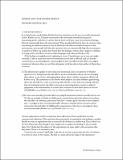Norms and the Knobe effect
Author(s)
Holton, Richard
DownloadHolton_Norms and.pdf (142.6Kb)
OPEN_ACCESS_POLICY
Open Access Policy
Creative Commons Attribution-Noncommercial-Share Alike
Terms of use
Metadata
Show full item recordAbstract
In a justly famous study, Joshua Knobe found an asymmetry in the way we ascribe intentional action (Knobe 2003). Consider an executive who, motivated entirely by the goal of maximizing profit, embarks on a policy that he knows will also cause environmental damage. Does he intentionally harm the environment? Most people hold that he does. In contrast, when considering an otherwise identical case in which the side effects would be beneficial to the environment, most people hold that the executive does not intentionally help the environment. A number of follow-up studies have found that the finding is robust, that it applies to children as young as four, and that it occurs in other languages and cultures (Knobe 2006).
Date issued
2010-05Department
Massachusetts Institute of Technology. Department of Linguistics and PhilosophyJournal
Analysis
Publisher
Oxford University Press
Citation
Holton, Richard. “Norms and the Knobe Effect.” Analysis 70.3 (2010) : 417 -424.
Version: Author's final manuscript
ISSN
1467-8284
0003-2638